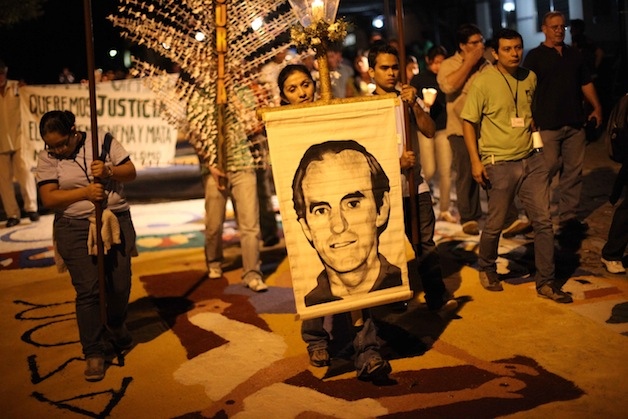
On the morning of November 16, 1989, an elite battalion of the Salvadoran Army entered the grounds of the Jesuit University of Central America, with orders to kill Father Ignacio Ellacuría—an outspoken critic of the Salvadoran military dictatorship—and leave no witnesses. When it was all over, the soldiers had killed six Jesuit priests, a housekeeper and her daughter in cold blood. The Jesuits Massacre is one of most notorious crimes of El Salvador’s 12-year civil war, which left over 75,000 people dead.
On November 13, 2008, CJA and the Spanish Association for Human Rights filed criminal charges in Spain against the former President of El Salvador and 19 former members of the military for the massacre. The Spanish court issued indictments against all accused. All but one of the defendants live in El Salvador — Colonel Inocente Montano, the former Vice Minister of Public Security who had been living outside of Boston, working as a candy-maker. As a result of the indictment in Spain and CJA’s advocacy, the Department of Homeland Security filed immigration fraud charges against Montano and he was sentenced to 21 months in prison.
As his release date neared in April 2015, pursuant to the Spanish National Court’s extradition request, the U.S. Department of Justice filed a complaint for Montano’s extradition to Spain. On February 5, 2016, the court ruled that Montano is eligible for extradition. On August 21, 2017, a North Carolina District Court let stand the court’s decision in denying Montano’s habeas corpus petition challenging his detention. Montano appealed the ruling and on November 15, 2017 , the eve of the 20th anniversary of the Jesuits Massacre, the U.S. Supreme Court declined to stay the ruling. On November 29, Montano was extradited to Spain.
The same day as the initial decision regarding Montano’s eligibility for extradition from the U.S., the Salvadoran national police arrested four defendants in the Spanish criminal trial. The Court ruled against extraditing the four defendants under arrest to Spain because they had been previously tried for the Jesuits Massacre. The court reinstated the status quo prior to the amnesty law, leaving one officer, Colonel Guillermo Benavides, in prison having been previously convicted, and three soldiers freed having been previously acquitted.
On July 13, 2016, the Constitutional Chambers of the Supreme Court of El Salvador declared the General Amnesty Law for Consolidation of Peace of 1993 unconstitutional, a law that had protected others implicated in the Jesuits Massacre. The government has yet to arrest any other defendants in the Jesuits Massacre case.
As of January 1, 2017, former CJA Transitional Justice Director, Almudena Bernabeu has retained the clients in the Jesuits Massacre case through her new firm Guernica 37.